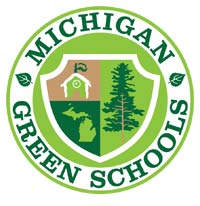Michigan Green Schools

Congratulations 2019-2020 Michigan Green School Recipients!
The Michigan Green Schools initiative recognizes both public and private schools for the activities the schools undertake to promote sound resource management, energy conservation, and environmental stewardship. This year qualifying applications were receive from six (6) schools here in Bay County.
Green Level | Emerald Level | Evergreen Level |
| Busch Elementary School
2 years participation
10 points | Auburn Area Catholic School
9 years participation
18 points | Bay Arenac ISD Career Center
7 years participation
25 points |
| | Bay-Arenac Community High School
3 years participation
15 points | John Glenn High School
8 years participation
22 points |
| | | Washington Elementary School
1 year participation
20 points |
| | |
Have you ever wondered what you can do to help build a greener community?
Michigan Green Schools is a nonprofit agency dedicated to help Michigan Schools with their environmental goals. Michigan Green Schools is a program designed for both public and private schools to help them achieve environmental goals including protecting the air, land, water and animals of our state along with world outreach through good ecological practices and the teaching of educational stewardship of students pre-kidnergarten through senior high school.
It’s also a great way to get involved in helping to build a greener community, starting at your own school. By focusing on Reduce/Reuse/Recycle, Energy and Environmental Protection at your school, you can directly make an impact on protecting the air, land, water and animals of our state. There’s also a good chance your school is currently participating in activities that would qualify for Michigan Green School designation.
There is no cost to become a Michigan Green School, just have your school fill out the application form and designate a teacher to coordinate green activities.
Michigan Green School Applications
Below is some additional information:
Grant Programs
Releaf Michigan:
Releaf Michigan is accepting applications for neighborhood tree planting for spring and fall. For more information or an application form, please send and email to [email protected]. Releaf Michigan is looking for communities in need of replanting from the devastation caused by the Emerald Ash Borer (EAB) and communities which have a stream, river, lake or some other body of water adjacent to or within the community's boarders. Releaf Michigan is always looking to work with schools.
Captain Planet Foundation:
Amount:$250 - $2,500
Deadline: September 30th- typically for spring and summer projects
February 28th- typically for fall and winter projects
Additional Information: Projects must promote understanding of environmental issues, focus on hands-on involvement, and involve K-12 youth. For more information, contact: Taryn Murphy at:(404) 827-4130 or [email protected].
Mantis Tiller Award:
Amount: 25 programs will each receive a Mantis Tiller/Cultivator with border/edger and kickstand, and their choice of gas-powered 2-cycle engine or electric motor. Total value: $349.00.
Additional Information: Applicants must operate a charitable or educational program that is not-for-profit in the United States. The tiller may not be used as a prize for fundraising (e.g., auction or raffle).
Project Learning Tree: Green Works!:
Amount: Grants are available in two award levels:
1.) The popular and traditional Green Works! grants up to the maximum of $1,000, and
2.) Green Works! htsnyd up yo $3,000 for registered PLT Green Schools!
Deadline: September 30, 2015
Additional Information: Do you have an idea for a school/community native plant gardent, a forest improvement project, a streamside restoration plan, a recycling program, or energy conservation project for your students? Need funds to implement it? Apply for a Project Learning Tree Green Works! grant.
Wild Ones: School Gardens & Community Nature Areas:
Amount: Cash awards range from $100 to $500. Funds will be provided only for the purchase of native plants and seed for the grant-award year. Successful grants are eligible for partnership with SFE native-plant-nursery partners for discounts on seed, plants, etc.
Deadline: October 15
Additional Information: Project goals should focus on enhancement and development of an appreciation for nature using native plants. Projects must emphasize involvement of students and volunteers in all phases of development, and increase the educational value of the site. Creativity in design is encouraged, but must show complete and thoughtful planning. The use of, and teaching about, native plants and the native-plant community is mandatory, and the native plants must be appropriate to the local ecoregion and the site conditions (soil, water, sunlight). The Project Coordinator should be knowledgeable and committed. Examples of appropriate projects are:
- Design, establishment and maintenance of a native-plant community such as prairie, woodland, wetland, etc., in an educational setting such as an outdoor classroom.
- Developing and maintaining an interpretive trail landscaped with native plant communities.
- Developing a wetland area to study the effect of native vegetation on water-quality improvement.